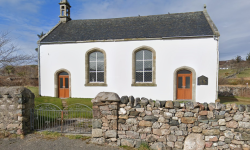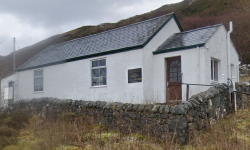Neil MacBride 1764-1814
Neil MacBride was born in 1764 in Auchencairn, in the south east of the Island of Arran, not far from where his great work was to be accomplished in the parish of Kilmory in the south of the Island. His father Patrick MacBride was a farmer. He was educated at Glasgow University and subsequently licensed by the Presbytery of Edinburgh. He was appointed by the Society in Scotland for Propagating Christian Knowledge to their mission station at Eriboll upon the departure of the Rev John Robertson to be minister of the Gaelic Chapel of Ease in Rothesay. Macbride was ordained by the Presbytery of Tongue as missionary on 2nd April 1800. He served two and half years at Eriboll, Kinlochbervie and Melness, where his arduous labours were said to be much blessed to the people. He was subsequently called and ordained to Kilmory on 18th Nov. 1802. For the next 12 years, his ministry was much blessed to the people, and the progress of the cause of Christ much advanced, culminating in the great Arran revival of 1812. He died on 8th July 1814, much lamented. Mr MacBride was a spiritual father to his nephew, the Rev Peter MacBride of Rothesay. The brothers Finlay and Archie Cook are also thought to be converted under his ministry.
A sermon by the Rev David Carment, which was preached at Duke Street Gaelic Chapel a few days after MacBride’s death, evidences the minister and his labours.
Anecdote of Rev Neil MacBride at a communion in Kinlochbervie:
“The famous John Robertson, of Kingussie, was the first of a succession of excellent ministers, who served the Mission. He was succeeded by Mr. Neil M’Bride, afterwards of Kilmory, Arran. Major MacKay, of Eriboll, who was himself a professing Christian, had a piano in his home, and the minister refused to pray in his house so long as this instrument was played in it. The Major told him he was not to worry, as the Lord enabled him to conduct worship in his own home and in that of many others.
The difference of views and feelings came to a head on a New Year’s eve, when the Major gave an entertainment and dance to all his dependents. ‘It was his habit to do this, that he might have them all at the same time under his own supervision, and save them from congregating in questionable places, where some of them were in danger of disgracing themselves with drunkenness and riotous conduct. Entertainment he knew they must have, and he thought they ought to have it in a harmless and healthful way, that would save them from having it in a way demoralising to them.’
Mr. M’Bride looked upon it differently, and thought the Major was setting others an evil example. He denounced the evil in public, and so the breach widened. Excellent as Mr. M’Bride was, and much esteemed, still the sympathies of the good people were more with the Major than with him.
This state of matters, however, led regardless characters to play a practical joke of a disgraceful kind on the minister. Like Mr. Robertson, Mr. M’Bride administered the Lord’s Supper at Kinlochbervie as well as at Eriboll. Every thing necessary was not so easily obtained then as now. He had, therefore, to take a journey across the Moine to Tongue to get the needed bread and wine. On returning to Eriboll, these, together with the communion plate, were securely packed in creels, to be slung from a “crubag” and carried on horseback. All was so placed as to be ready for an early start next morning.
After much fatigue, Kinlochbervie was reached in due time, and, when the minister’s wants were attended to, they set about all necessary preparation for the communion. On unpacking the creels, both minister and elders were shocked to find that everything had been abstracted-plate as well as wine-and their weight made up with stones and sod. This must have been done during the night before starting from Eriboll, and naturally enough-whoever the miscreants that did it the doing of it was attributed to the state of feeling that existed between Mr. M’Bride and Major MacKay.
Mr. M’Bride and those congregated for the solemnity, however, determined that the communion should not be deferred. Before Saturday, wine and flour were secured, Mr. M’Bride himself is said to have baked the bread, and stoneware was used instead of plate. Though the outward provision was thus of the humblest and most primitive kind, still the communion Sabbath was a day to be remembered – a day whereon the Lord vouchsafed His gracious presence in a way that filled the hearts of His people with a feast of good things.
The people of Kinlochbervie were indignant at what was done, as being a slight upon them, as well as upon Mr. M’Bride, so they determined to collect and present him with a new set of communion plate. They entrusted the securing of it to a Mr. Robert MacKay, who was called to Inverness or Edinburgh for examination in connection with his being appointed as teacher in the district by the Society for Propagating Christian Knowledge.
He bought the plate, and got Mr. M’Bride’s name engraved on it. But on his return, he found Mr. M’Bride had left the Reay country to enter upon his charge in Arran, and, being gone, the ardour of the people cooled, and the collection to defray the expenses of the plate was never made. Mr. MacKay, therefore, made a present of it to his friend, the Rev. Mr. Falconer, Eddrachillis, and his successor in office. At the Disruption it was the personal property of the Rev. George Tulloch, who joined the Free Church, and he in his turn left it to the congregation of the Free Church at Scourie, and we presume it is still used there at communion seasons.”
Source: Kinlochbervie, Being the story and traditions of a remote Highland parish and its people, Alexander Macrae, 102pp.,Tongue.

